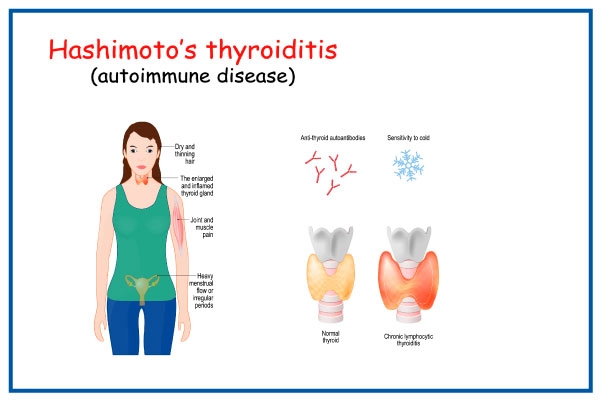What is Hashimoto Disease?
Hashimoto's disease, also known as Hashimoto's thyroiditis or chronic autoimmune thyroiditis or chronic lymphocytic thyroiditis, is an autoimmune disease in which the thyroid cells are destroyed via cell and antibody-mediated immune processes.
It is a common thyroid gland disorder in which the antithyroid antibodies strike the thyroid gland resulting in inflammation and destruction of the tissue, affecting its ability to produce adequate amounts of thyroid hormones.
The thyroid gland is a vital hormonal gland that’s present in the front part of the neck, under the voice box and surrounds the windpipe (trachea). It is a butterfly-shaped organ consisting of two lobes on either side of the windpipe (trachea) and is connected at the front by a narrow strip of tissue.

Three hormones are produced by the thyroid gland:
- Triiodothyronine, also known as T3 ( controls metabolism)
- Tetraiodothyronine, also called thyroxine or T4( controls metabolism)
- Calcitonin( calcium homeostasis)
Hashimoto's thyroiditis symptoms:
Hashimoto advances slowly, and its symptoms may include:
- Goitre
- Weight gain
- Cold insensitivity
- Constipation
- Facial puffiness
- Menstrual irregularities
- Infertility
- Hair loss
- Dry skin
- Excessive sleepiness
- Depression
- Hoarseness of voice
- Joint and muscle pain
- Difficulty concentration, poor memory
- Low heart rate
Causes
Hashimoto's is an autoimmune thyroid disease. The body's immune system produces antibodies that target thyroid cells, assuming them to be bacteria, viruses or a foreign body. It reduces the ability of the thyroid gland to produce sufficient thyroid hormones.
The disease onset may be due to:
- Genetic factors
- Environmental factors such as stress or radiation exposure.
- Excessive iodine
Risk Factors
The risk factors of Hashimoto's disease include
- Sex : Women are more vulnerable to getting Hashimoto's disease, maybe related to the sex hormones.
- Middle age : Hashimoto's disease is more commonly observed in middle age groups, but it can occur at any age as well.
- Other autoimmune diseases : Other autoimmune disorders like type 1 diabetes, rheumatoid arthritis, or lupus may raise the risk of developing Hashimoto's thyroiditis.
- Genetics and family history : If thyroid disorders or other autoimmune diseases run in the family, it increases the chances of Hashimoto's thyroiditis in a person.
- Excessive iodine intake : Extreme iodine intake in the diet may act as a trigger factor among individuals already at risk for Hashimoto's disease.
- High radiation exposure : People exposed to high environmental radiation levels are more vulnerable to Hashimoto
Complications
Complications of Hashimoto's thyroiditis are as follows:
- Goitre : It is an enlargement of the thyroid gland and may interfere with breathing or swallowing
- Heart problems : Low heart rate, Hypertension,Dyslipidemia, Heart failure
- Fertility : Decreased fertility is observed with hypothyroidism, A pregnant woman with untreated Hashimoto's disease can have a baby with low IQ, Cretinism, Preterm baby, Abortion risk
Diagnosis
The doctor will ask for the patient's medical history and perform a physical examination and laboratory testing to diagnose the symptoms.
- Thyroid profile test : Thyroid profile test Your doctor will recommend blood tests to find out if hypothyroidism is the main cause of the symptoms. They may include
- TSH test: The pituitary gland produces Thyroid stimulating hormone (TSH). When the pituitary notices low levels of thyroid hormones in the blood, it sends TSH to the thyroid gland to stimulate an increase in thyroid hormone production. High blood TSH levels signify hypothyroidism.
- Total T4 & Free T4 and Total T3 test: Triiodothyronine (T3) and thyroxine (T4) are thyroid hormones. Low levels of T4 & or free t4 and T3 tests confirm the findings of the TSH test and point to a thyroid problem.
- Thyroid antibody test : The antibody test for Hashimoto's thyroiditis measures Anti TPO( thyroid peroxidase) +/- Anti TG( thyroglobulin) antibodies. Presence of antibodies may indicate underlying autoimmune hypothyroidism
Treatment
To treat hypothyroidism, the majority of Hashimoto's patients take medication. In the case of normal hormone levels, no treatment is needed but regular TSH test and thyroid hormone tests done.
T-4 hormone replacement therapy
Hashimoto's disease-related hypothyroidism is treated with a synthetic hormone called levothyroxine. This synthetic hormone functions like the T-4 hormone produced naturally by the thyroid gland.
The treatment aims to restore and maintain sufficient T-4 hormone levels and improve hypothyroidism symptoms.
The thyroiditis disease symptoms will reappear if thyroid medication is stopped in between.
